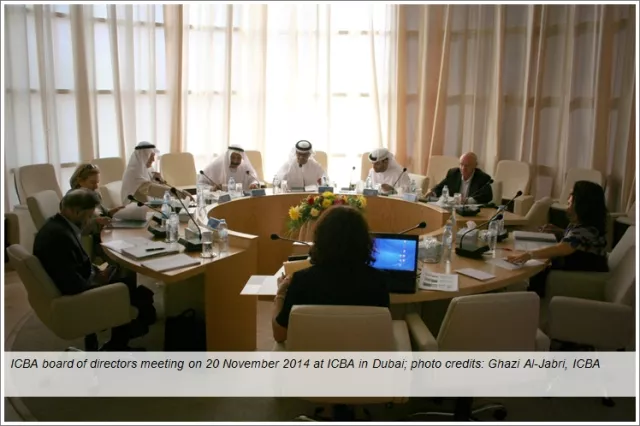ICBA Board of Directors Inspects ICBA’s Impact on Agriculture in Marginal Lands
The International Center for Biosaline Agriculture (ICBA) was honored to host its Board of Directors on 19-20 November 2014 at the Center’s headquarters in Dubai. ICBA Board of Directors includes internationally renowned scientists and leaders in the areas of agriculture, finance and international development from regional and international organizations.
The board members visited the facilities and the ongoing projects in the field and met with ICBA scientists to discuss the status of current and future projects. They were also given a snapshot of the impact ICBA’s work has on the future of agriculture in marginal lands—Policies for Resilience. Day two included a closed session in which the board reviewed the financial statements of the center, the various achievements of 2014 in line with ICBA’s 2013-2023 Strategy, and future plans.
ICBA was established by the Islamic Development Bank and the Government of the United Arab Emirates (UAE) in 1999 as an international, research and development organization aiming to strengthen agricultural productivity in marginal and saline environments through identifying, testing and facilitating access to sustainable solutions for food, nutrition and income security.
In light of the growing world population and food demand, coupled with the adverse effects of climate change, the need for expertise in utilizing marginal lands for nutritional food production will increase. Scientists predict that the world is losing more than 1.5 million hectares of agricultural land each year as a result of high salinity levels in the soil. In the Middle East and North Africa and Central Asian countries, 6.7% of the total land area is affected by salinity..
During the past five years, ICBA has conducted several studies and strategies with the UAE Ministry of Environment and Water and the Environment Agency – Abu Dhabi covering subjects related to water conservation, water policies and laws, environmental guidelines, and sustainable agriculture.
Affecting policies is one side of the coin. The other is empowering the smallholder farms in marginal environments. Thus ICBA is identifying the best crops, in terms of productivity and nutritional value, for various marginal regions as well as identifying the best farm management practices. Simultaneously, that knowledge is being disseminated to individual smallholder farms through various national farmers’ services and unions..
ICBA’s multi-pronged approach to address salinity issues and strengthening the agricultural sector through better access to technology, improved germplasm, policies, strategies and programs, is critical to achieve greater water, environment, food, nutrition, and income security. As more and more countries start struggling with agricultural land degradation and salinity issues, ICBA’s ground breaking research will be vital in meeting future food demands.
